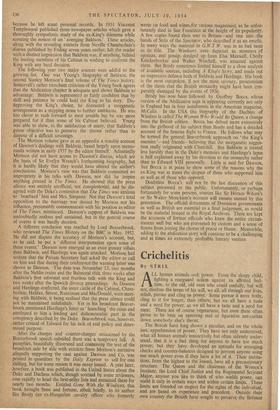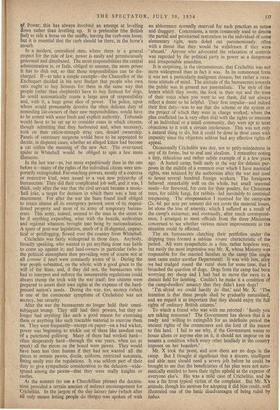By STRIX A . LL human animals seek power. From
the sleepy child, fighting a rearguard action against its allotted bed- time, to the old, old man who could usefully, but will not, disclose the terms of his will, we all, all through our lives, relish, pursue and cling to power. Some pursue it more hotly, cling to it for longer, than others; but we all have a taste and a need for power, as we all have a taste and a need for meat. There are of course vegetarians; but even these often prove to be bent on ramming real or figurative nut-cutlets down somebody else's throat.
The British have long shown a peculiar, and on the whole just, apprehension of power. They have not only understood, what all human animals instinctively but often infirmly under- stand, that it is a bad thing for anyone to have too much power; but they have developed an aptitude for arranging checks and counter-balances designed to prevent anyone using too much power even if they have a lot of it. Their institu- tions, from the highest to the lowest, have all a precautionary structure. The Queen and the chairman of the Women's Institute, the Lord Chief Justice and the Regimental Serjcant Major, anyone you like to think of who wields power, can wield it only in certain ways and within certain limits. These limits are founded on respect for the rights of the individual, and are based on experience and precedent. Outside their own country the British have sought to preserve the Balance Of Power; this has always involved an attempt at levelling down rather than levelling up. It is preferable (the British feel) to ride a horse on the snaffle, leaving the curb-rein loose; but it is essential that the curb should be there, in the horse's mouth.
In a modern, centralised state, where there is a general respect for the rule of law, power is easily and promiscuously generated and distributed. The more responsibilities the central administration is, or feels, obliged to assume, the more poWer it has to dish out, so that those responsibilities can be dis- charged. If—to take a simple example—the Chancellor of the Exchequer decided in his next Budget that people who own cats ought to buy licences for them in the same way that people (other than shepherds) have to buy licences for dogs, he could automatically create a large area of responsibility and, with it, a huge great slice of power. The police, upon Whom would presumably devolve the often delicate duty of reminding cat-owners of their new responsibilities, would have to be armed with some fresh and explicit authority. Tribunals would have to be set up to consider cases in which citizens, though admitting that they harboured and, when necessary, took on their ration-strength stray cats, denied ownership. Panels of veterinary surgeons would have to be appointed to decide, in disputed cases, whether an alleged kitten had become a cat within the meaning of the new Act. The over-taxed spider in Whitehall would be obliged to spin a few more filaments. • In the last war—as, but more expeditiously than in the one before it—many of the rights of the individual citizen were tem- porarily extinguished. Far-reaching powers, mostly of a coercive or restrictive kind, were issued to a vast new polyarchy of bureaucrats. They did their complicated job well, and it was, I think, only after the war that the civil servant became a music- ball joke, a target for derision in which there was a hint of resentment. For after the war the State found itself obliged to retain almost all its emergency powers, most of its requisi- tioned property and most of its army of temporary bureau- crats. This army, indeed, seemed to the man in the street to be if anything expanding, what with the boards, authorities and regional whatnots brought into being by nationalisation. A spate of post-war legislation, much of it ill-digested, unprac- tical or pettifogging, flowed over the country from Whitehall.
Crichelitis was fairly widespread in those days. Anybody, broadly speaking, who wanted to get anything done was liable to come up against it; and land-owners in particular (who in the political atmosphere then prevailing were of course not at all conune it Taut) were constantly aware of it. During the war people submitted, on the whole, with a good grace to the will of the State, and, if they did not, the bureaucrats who had to interpret and enforce the innumerable regulations could always trump the trick with the war itself; few citizens were prepared to assert their own rights at the expense of the hard- pressed nation's needs. During the war, too, secrecy (which is one of the commoner symptoms of Crichelitis) was not secrecy, but security. After the war the bureaucrats no longer held their omni- subjugant trump. They still had their powers, but they no longer had anything like such a good reason for exercising them or anything like such tractable material to exercise them on. They were frequently—except on paper—on a bad wicket; power was beginning to trickle out of them like sawdust out. of a punctured golliwog. Many of them had worked hard— often desperately hard—through the war years, when (so to speak) all the pieces on the board were pawns. They would have been less than human if they had not wanted all the pieces to remain pawns, docile, uniform, restricted automata, fitting easily into the regulations. It was seldom part of their duty to give sympathetic consideration to the delusion--wide- spread among the pawns—that they were really knights or castles.
At the summit (to use a Churchillian phrase) the doctrin- aires provided a certain amount of indirect encouragement for Crichelitis. In the jargon of the day laissez faire (which after all only means letting people do things) was spoken of with an abhorrence normally reserved for such practices as suttee and thuggery. Concessions, a term commonly used to denote the partial and provisional restoration to the individual of some elementary right, were doled out parsimoniously, often with a threat that they would be withdrawn if they wero abused.' Anyone who advocated the relaxation of controls was regarded by the political party in power as a dangerous and irresponsible anarchist.
It is surprising, in the circumstances, that Crichelitis was not more widespread than in fact it was. In its commonest form it was not a particularly malignant disease, but rather a vexa- tious attitude of mind. The attitude of the bureaucrats towards the public was in general not paternalistic. The style of the letters which they wrote, the look in their eye and the tone of their voice when you went to see them, did not always reflect a desire to be helpful. Their first impulse—and indeed their first duty—was to see that the scheme or the system or the project of which they were in charge worked; where the plan conflicted (as it very often did) with the rights or interests of an individual or a small community, they were apt to treat objections to it with a certain intolerance. This was not only a natural thing to do, but it could be done in Most cases with impunity since the objectors seldom had any effective rights of appeal.
Occasionally Crichelitis was due, not to petty-mindedness in any of its forms, but to zeal and idealism. I remember noting a tiny, ridiculous and rather subtle example of it a few years ago. A hutted camp, built early in the war for defence pur- poses in the middle of a common over which I have manorial rights, was retained by the authorities after the war and used to house several hundred foreign workers. The foreigners behaved remarkably well on the whole, but small seasonal needs—for firewood, for corn for their poultry, for Christmas trees, for edible fungi, for rabbits—led inevitably to continual trespassing. The compensation I received for the camp-site (2s. 4d. per acre per annum) did not cover the material losses, let alone the loss of amenity, which I suffered as a result of the camp's existence; and eventually, after much correspond- ence, I arranged to meet officials from the three Ministries concerned to see whether various minor improvements in the situation could be effected.
The six bureaucrats clutching their portfolios under the dripping trees formed a tableau vivant characteristic of the period. All were sympathetic in a dim, rather hopeless way, but easily the most impressive was Mr. X, whose Ministry was responsible for the married families in the camp (the single men came under another Department). It was with him, after we had trudged round the rural slum for some time, that I broached the question of dogs. Dogs from the camp had been worrying my sheep and I had had to move the ewes to a distant field for lambing. Couldn't he make it a condition 'of the camp-dwellers' tenancy that they didn't keep dogs? I'm afraid we could hardly do that,' said Mr. X. The intention is that these people shall be gradually naturalised, and we regard it as important that they should enjoy the full rights of ordinary British citizens.'
To which a friend who was with me retorted : ' Surely you are talking nonsense? The Government has shown that it is ready and willing to extinguish for an indefinite period the ancient rights of the commoners and the lord of the manor to this land. I fail to see why, if the Government wants to house aliens or anyone else on it, it should not impose on its tenants a condition which every other landlady in the country imposes on her boarders.'
Mr. X took the point, and now there are no dogs in the camp. But I thought it significant that a sincere, intelligent and able man should need a severe jolt before he could be brought to see that the beneficiaries of his plan were not auto- matically entitled to have their rights upheld at the expense of everyone else's. His was a mild case of Crichelitis, and he was a far from typical victim of the complaint. , But Mr. X's attitude, though his motives for adopting it did him credit, well illustrated one of the basic disadvantages of being ruled by babus.



































 Previous page
Previous page